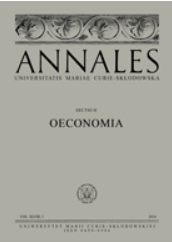State Capitalism in Poland
State Capitalism in Poland
Author(s): Piotr Kozarzewski, Maciej BałtowskiSubject(s): National Economy, Business Economy / Management, Micro-Economics, Economic history, Government/Political systems, Transformation Period (1990 - 2010), Present Times (2010 - today), Post-Communist Transformation
Published by: Wydawnictwo Naukowe Uniwersytetu Marii Curie-Sklodowskiej
Keywords: state capitalism; post-communist transition; state-owned enterprises; rent seeking;
Summary/Abstract: Theoretical background: The article is devoted to the knowledge gap in understanding processes of growing state interventionism in a number of post-communist countries, Poland being one of the most notable examples. This evolution is still understudied in the literature, both in terms of evidence and proper theoretical framework. Existing theoretical perspectives have been created for studying other types of economies an do not fully fit the transition ones. Among these perspectives, the state capitalism (SC) one seems to be the most promising. Purpose of the article: The task of this paper is to study the growing state interventionism in Poland using the state capitalism approach which had to be refined by the authors in order to be more applicable for analyzing transition economies. Using this framework, the history of SC formation and its present state in Poland are studied, including specific features of Polish state capitalism, e.g. the importance of the state-owned enterprise (SOE) sector as the source of rents, as well as the varieties of the state control over the enterprise sector. Research methods: The article makes use of mostly qualitative methods, quantitative ones playing an auxiliary role by systematizing evidence used in qualitative research. The study was based on analysis of the existing literature and evidence of interventionist practices of the Polish government. The authors attempted to fine-tune the SC approach both through refining its definition and including areas previously mostly neglected by SC studies such as relationships between the state and the enterprise sector. They created a typology of SC phenomena in transition economies which made it possible to study the Polish case in a comprehensive way. Main findings: At this stage, the authors think that no strict definition of state capitalism is possible because of its highly contextual character. Thus, the outcome of the study may not be universal, but the authors believe that their concept of six basic features of state capitalism may be applicable not only to Poland, but to other transition economies as well. Besides, the article raises awareness of the importance of state-controlled enterprises in studies on state capitalism. The article also identifies challenges for further research and the still existing knowledge gaps. Among others, the questions remain, whether the statist trends in Poland and other countries lead to a system change and what are the roots of these trends.
Journal: Annales Universitatis Mariae Curie-Skłodowska, Sectio H Oeconomia
- Issue Year: LVI/2022
- Issue No: 1
- Page Range: 61-77
- Page Count: 17
- Language: English

